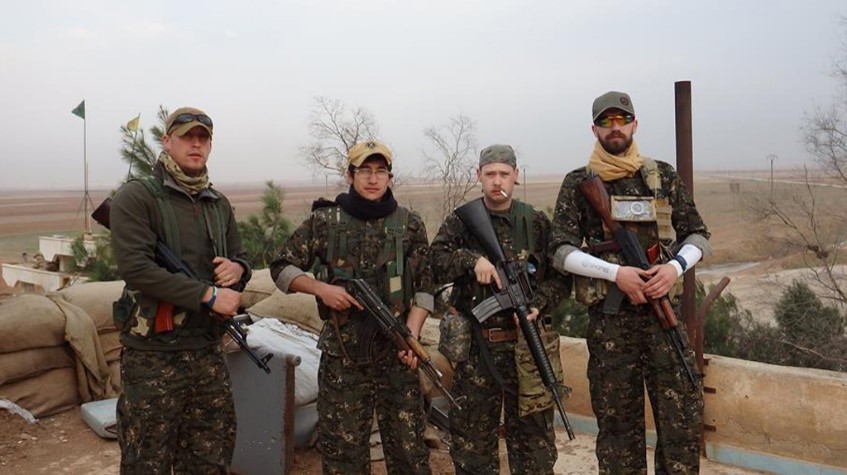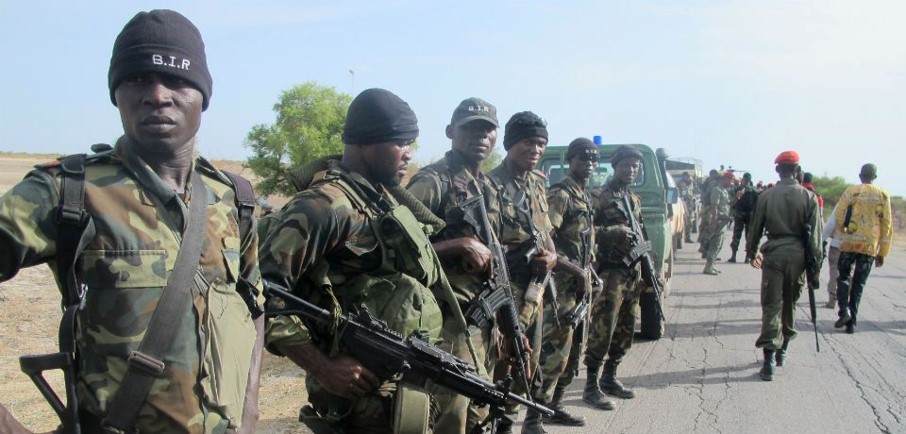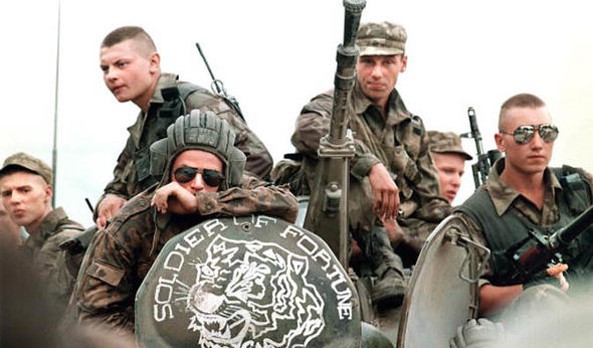by J. R. Olson
Mercenary. A noun with a lot of historical and literary baggage. Dictionary.com defines the term as “a professional soldier hired to serve in a foreign army… a soldier of fortune”. I’ve always liked the term “hired gun,” like the characters in the movie The Magnificent Seven, or the more poetic “dogs of war,” the title of the Frederick Forsyth novel and a movie starring Christopher Walken.

Photo courtesy of Channel 4 News, United Kingdom, 2014
These men live outside the law and are often portrayed as colorful characters, a little bit brigand and a little bit hero. (That depends, of course, on which side of the conflict are on…) But living outside the law comes with consequences. Unlike soldiers in a state-authorized military, mercenaries are not recognized by the Geneva Conventions, so their fate is uncertain should they be captured on the battlefield.
There have been mercenary armies throughout history—men who received compensation from a ruler to fight battles. Examples include “The Mighty Ten Thousand,” which Xenophon describes as the Greek soldiers hired into service around 400 B.C. by Cyrus the Younger to dislodge his brother, King Artaxerxes II, who ruled Persia. Or John Hawkwood, who led the White Company, an amalgamation of English, German, Breton, and Hungarian troops who fought and bled during the Italian wars in the 13th Century, all for pay rather than patriotism or survival.
Discussions of mercenary armies from antiquity are often less interesting than the exploits of individual mercenaries who made headlines in the 1960s, 70s, 80s, and even into the 1990s. Men like “Mad Mike” Hoare, a British-Irish mercenary who fought in World War II and went on to ply his unique skills in the Katanga province in 1961, and again in the Simba Rebellion in 1964—both in The Congo. Hoare went on to serve as technical adviser in the production of the movie The Wild Geese, a classic example of mercenary warfare in Africa. Hoare was also part of the failed coup d’état in The Seychelles in the early 1970s and subsequently spent a decade in prison. He has been a prolific author and his works can be found in print today. He’s still alive, should you wish to contact him. At least he was when this article was penned. He was born March 17th, 1919, which means he is now over 100 years of age![1]
There are other famous mercenaries who were aligned with Hoare. Bob Denard, a French mercenary, was born Gilbert Bourgeaud, but he also used the alias Said Mustapha Mahdjoub during his lifetime. He served in the French Navy during the Algerian War, then tried to assassinate the French Prime Minister. He was jailed but released after 14 months stay under the care of the French government. Denard was involved in the Katanga province in 1961 with Mike Hoare and went on to participate in four separate coup attempts in The Comoros Islands between 1975 and 1995. Denard also involved himself in mercenary efforts in places like Yemen, Nigeria, Benin, Gabon, and even Iran, and often had the support of the French DGSE. Denard was born a Catholic, converted to Judaism, then to Islam, and finally back to Catholicism before his colorful life ended in 2007 when he succumbed to the ravages of Alzheimer’s.
Other names you might recognize are Jean Schramme, a Belgian mercenary, or Simon Mann, a Sandhurst graduate who commissioned into the Scots Guards, then joined the 22 SAS. After leaving British military service, Mann established Sandline International, one of the earliest private security companies, and went to work for the government of Papua New Guinea suppressing a revolt. Sandline was an early “private security company” designed to represent respectable business dealings. Later, Simon Mann served part of a prison sentence for a coup attempt in Equatorial Guinea. One of his many accomplices in that affair also happened to be Sir Mark Thatcher, son of former UK Prime Minister Margaret Thatcher.
Finally, the company Executive Outcomes surely comes to mind for those familiar with their actions in Africa and in Papua New Guinea as a subcontractor to Sandline International. Executive Outcomes was founded by Eeben Barlow, a former officer in the South African military who sought to use trained, well-paid mercenaries to support covert operations in defense of South African strategic interests. He parlayed “security personnel” into broader operations, like with Sandline, over the course of ten years, but also with multinational corporations like De Beers, Chevron, Rio Tinto Zinc, and even Texaco. Barlow closed down the company in 1998 after South Africa passed laws limiting the activities of such companies.
These companies and larger-than-life personalities from the middle to later part of the 20th century have been replaced in the modern day by businessmen like Erik Prince, founder of Blackwater, which, after some potential criminal activities resulting in the deaths of seventeen Iraqi civilians, was renamed Xe, and is now known as Academi. This is just one of Prince’s companies, and this company alone has a 7,000-acre training facility in North Carolina. The company has reportedly employed as many as 20,000 people around the world for various types of “security services”.
Academi is but one of the modern-era private security companies. Other companies that recruit and hire former military personnel for private security work include Defion Internacional, a Lima, Peru-based firm, as well as Triple Canopy, and the biggest of them all, G4S Secure Solutions, which, as a private employer, is reportedly number two after Walmart in the number of employees on their payroll operating in roughly 125 nations around the world. Make sure you are sitting down. G4S employs approximately 625,000 people.
Private security contractors. That’s the newest term for what are essentially mercenaries. Just as some multinational shipping companies choose to flag their fleets in other nations to avoid more onerous regulations, so, too, with these private security contractors. While U.S.-flagged companies generally hold their people to some standard of lawful operations, that is not the case when it comes to some of their international competitors.
And then there are the freelancers. The photo at the beginning of this article is of four British citizens who volunteered to fight against the Islamic State in Syria.[2] They fought alongside Kurdish forces and have been joined by adventurers from the United States and many other nations as well. Not aligned with any private security company, such men truly are soldiers of fortune. If they were captured by the Islamic State, they’d surely be executed, and if they return to the U.S. or their home nation, they may be tried under criminal law for their actions in Syria.
Another place where mercenaries have been active is Yemen. A Buzzfeed News exclusive from October of 2018 revealed highly trained American ex-military special operations personnel had been recruited and sent to Yemen to eliminate – meaning kill – members of the political opposition under orders from the United Arab Emirates.[3] According to Buzzfeed News, the company that hired the soldiers and carried out the attacks inside Yemen was Spear Operations Group, incorporated in Delaware and founded by Abraham Golan, a charismatic Hungarian-Israeli security contractor who lives outside of Pittsburgh, Pennsylvania.

South African Mercenaries Hired by Nigeria to Fight Boko Haram, Foreign Policy, March 12th, 2015
American military personnel, trained to become elite special operations warriors inside the U.S. military, leave service with a particular set of skills–skills that often don’t have much use in the civilian world. But they can parlay those skills for work in the margins, with companies that frame their work as private security contractors, or, more specifically, private military contractors (PMCs). A trained operator can make hundreds of thousands of dollars each year working contracts for these companies, so, there is the lure of easy money for men and women with the right set of skills to ply their expertise around the world.
And this brings us back to Erik Prince, head of Academi.
If you’ve been paying attention to the conflicts in Afghanistan, you’ve likely heard that Erik Prince has been pushing the idea the U.S. military should withdraw and hand the security mission over to his company. He has lobbied in the newspapers for the Trump Administration to hire him to fight the war against the remnants of the Taliban, al-Qaeda, and the Islamic State.[4]
If this should come to pass, it would fundamentally alter what it means for the United States—or any sovereign nation–to prosecute conflict in the modern era. Instead of raising armies, spending money on training, and the costs to support a military in a conflict, let alone deal with the medical wounds suffered by soldiers after their service, perhaps it is cheaper and easier to simply subcontract out combat capabilities using a PMC.
Finally, to further complicate matters, David Isenberg and Andrew Salmon reported in the Asia Times[5] on January 15th, 2019 that PMCs, mostly U.S.-flagged, have profited significantly from their work in the margins of the U.S.-led counterterrorism campaigns around the world. But global entry into the marketplace is expanding, to include companies based in Russia. U.S. PMCs generally serve in logistics support or security roles, but the Russian-led PMCs like the Wagner Group have engaged in direct combat against the Islamic State in Syria, as well as against those groups deemed hostile to Bashar al-Assad’s continued reign. This means that Russian mercenaries have killed people merely for standing up to Assad. Other reports indicate Russian mercenaries may also be operating in Ukraine. You may recall such reports when Crimea was “invaded” by these little green men.

UK Express, October 12th, 2017, Russian Mercenaries Fighting in Syria, Image Courtesy of Getty
In a recent article by Kyle Rempfer in Military Times, the author quotes General Stephen Townsend, who has been nominated to take over as the next commander of U.S. Africa Command, regarding the Wagner Group. “They’re quasi-military, and as we saw play out in Crimea and Ukraine, little green men running around, not necessarily following rules or behavior we would expect from proper armies. So, I have a pretty significant concern for the use of these kinds of forces and the way that the Russians are using them on the continent.”
Lastly, we come back to Erik Prince for our final round of double jeopardy. Prince is deputy chairman on the board of yet another private security company—this one called Frontier Services Group, which was incorporated in Hong Kong. FSG has several contracts with the People’s Republic of China for what Prince has termed as purely logistics and construction support in the Xinjiang Province of western China. Yet, when pressed during an interview by journalist Mehdi Hasan, Prince could not explain his own company’s public affairs release detailing security training operations, which, when one understands that over one million Uyghurs are currently being detained in western China in what are deemed “re-education camps,” raises concerns and questions about Prince’s involvement in what might be violations of international rules and norms, let alone State Department regulations about Americans’ activities abroad.
Alas, we’ll have to wait to see how all this plays out. It is certainly an interesting academic discussion when one also considers that Xinjiang is the gateway to China’s long-planned and deeply desired “Belt and Road” initiative, linking coastal China with western Europe, and Prince’s companies stand to earn hundreds of billions of dollars in coming decades for security, logistics, construction, or other services in support of another nations’ national security, foreign policy, or economic objectives—objectives that might be wholly contrary to American interests.
Sean McFate provides us some insight into the future world of mercenary warfare in his book The Modern Mercenary: Private Armies and What They Mean for World Order[6]. This is a book worth reading if you want to fully understand the modern world of mercenary warfare and the implications for foreign policy and national security for America, her allies and friends, and even for nations who stand opposed to the United States.
Only time will tell what path America chooses with regard to how we use private military contractors. In the meantime, there appears to be no shortage of men—and women—willing to earn their paycheck by fighting someone else’s war.
J.R. Olson, along with co-author David Bruns, form the Two Navy Guys writing team. Together, they pen national security thrillers about the men and women who keep our country safe from the risks of the 21st century. Their previous titles include Weapons of Mass Deception and Jihadi Apprentice. Their next novel, Rules of Engagement, about North Korean cyberwarfare, is being released through St Martin’s Press in June 2019. Find out more at www.davidbruns.com.
[1] Mike Hoare Check this for reference
[2] British Civilians Fighting with Kurds Against ISIS in Syria Check this for reference
[3] United Arab Emirates Hires U.S. Mercenaries Check this for reference
[4] Erik Prince’s Plan Check this for reference
[5] Western Mercenaries Ready for Syria, Russians Already There Check this for reference
[6] Sean McFate’s book, The Modern Mercenary: Private Armies and What They Mean for World Order Check this for reference
